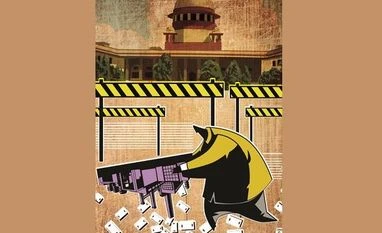As such, the scheme of arrangement under Section 230 of the Companies Act does not stop anybody from proposing a plan. However, if this provision is used to revive a company which is facing liquidation under IBC, the rules of 29A will apply in keeping with the intent of the law, the top court clarified.
Specifically in this case, the SC order barred promoters of Gujarat NRE Coke, a defaulting company, from proposing a revival plan in the event of liquidation under IBC.
“The stages of submitting a resolution plan, selling assets of a company in liquidation and selling the company as a going concern during liquidation, all indicate that the promoter or those in the management of the company must not be allowed a back-door entry in the company... Proposing a scheme of compromise or arrangement under Section 230 of the Act of 2013, while the company is undergoing liquidation under the provisions of the IBC lies in a similar continuum,” the SC judgment by bench comprising Justices Dhananjaya Y Chandrachud and MR Shah said.
The court was hearing the petition of Gujarat NRE Coke promoter Arun Kumar Jagatramka, who challenged the provision 2B introduced by the Insolvency and Bankruptcy Board of India (IBBI). The provision says that that a party ineligible to propose a resolution plan under the IBC cannot be a party to a compromise or arrangement.
“Any other interpretation would have left a gaping hole in the scheme of IBC and defeated the very object of section 29A bar introduced both for resolution and liquidation processes under the IBC,” said Misha (who only uses her first name), Partner at Shardul Amarchand Mangaldas & Co.
Legal experts said the latest order had settled the two conflicting positions of IBC, ensuring revival of the corporate debtor versus protecting the corporate debtor from its own management. What you cannot do directly you cannot do indirectly. “It would not be surprising to see the route of schemes of arrangement being completely discontinued during liquidation, given the incompatibility between the two processes,” said Harish Kumar, partner, L&L partners.
The SC also said the need for judicial intervention or innovation from the National Company Law Tribunal (NCLT) and National Company Law Appellate Tribunal (NCLAT) should be kept at its bare minimum and should not disturb the foundational principles of the IBC.
The ‘arrangement’ strategy was approved by the NCLT and NCLAT too in the interest of promoting the core objective of IBC - revival of a company. But, the idea was not to create room for a backdoor entry of defaulting promoters. It was in this context that IBBI had brought the provision 2B for liquidation proceedings.
“The purpose of disqualification is to ensure a sustainable revival, which means that those responsible for the state of affairs of a company and other persons regarded by the legislature as undesirable should be excluded from the process," said Raj Bhalla, partner, MV Kini and Co.
The impact of this judgment could be felt in many IBC cases where a resolution plan falls through and a company ends up in liquidation, with the promoter as the only hope left for revival. “If a firm ends up in liquidation, its employees lose their job and all public shareholding is written off. All this just to keep the promoter away,” an IBC lawyer said.
To read the full story, Subscribe Now at just Rs 249 a month
Already a subscriber? Log in
Subscribe To BS Premium
₹249
Renews automatically
₹1699₹1999
Opt for auto renewal and save Rs. 300 Renews automatically
₹1999
What you get on BS Premium?
-
Unlock 30+ premium stories daily hand-picked by our editors, across devices on browser and app.
-
Pick your 5 favourite companies, get a daily email with all news updates on them.
Full access to our intuitive epaper - clip, save, share articles from any device; newspaper archives from 2006.
Preferential invites to Business Standard events.
Curated newsletters on markets, personal finance, policy & politics, start-ups, technology, and more.
Need More Information - write to us at assist@bsmail.in
)